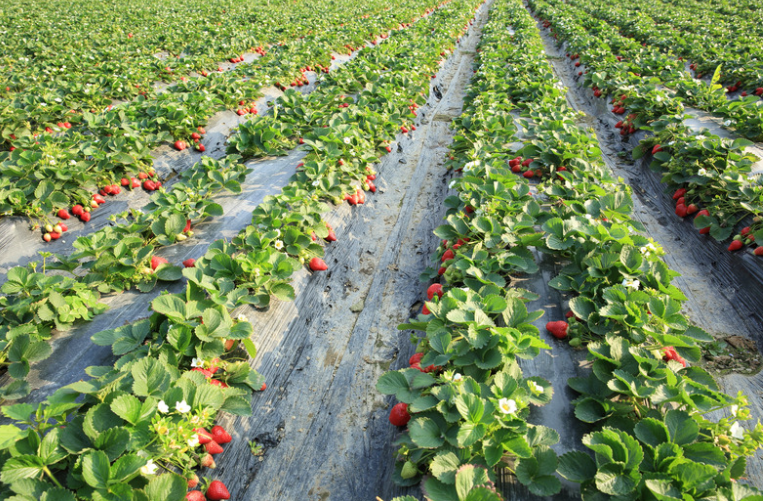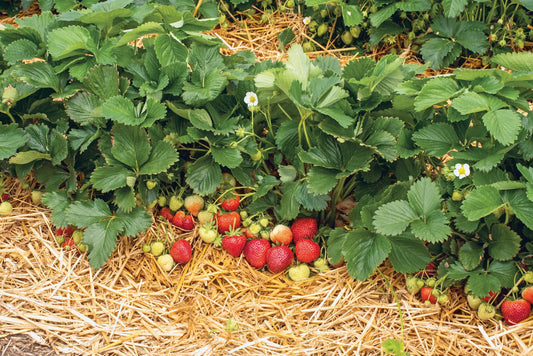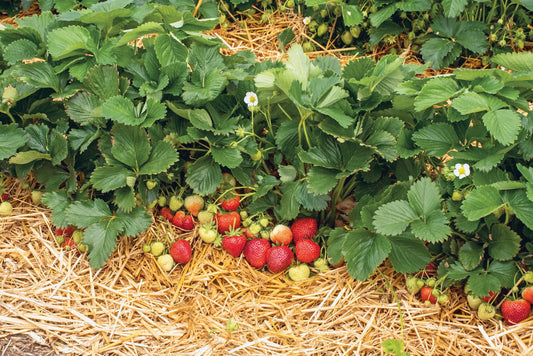Our Pajaro Strawberry plants at producer prices
Buy now and get it delivered when you're ready to plant
-
Parlando Fresh Bare-Root Strawberry Plant
Regular price €0,20 EURRegular priceUnit price / per -
Parlando Potted Strawberry Plant
Regular price €0,28 EURRegular priceUnit price / per -
Pajaro Fresh Bare-Root Strawberry Plant
Regular price €0,18 EURRegular priceUnit price / per -
Pajaro Frigo A+ Strawberry Plant
Regular price €0,21 EURRegular priceUnit price / per -
Pajaro Frigo A Strawberry Plant
Regular price €0,18 EURRegular priceUnit price / per
Collapsible content

Strawberry Plant Buying Guide: What Type of Plants? For What Market Opportunity?
Which format should you choose: refrigerated, fresh, tray-plants, waiting bed, or plugs? Compare yields, costs, and harvest times at a glance.
Download the PDF guide (13 pages)
Why read this guide?
- Comparison tables: yield (300–600 g/plant), cost & labor.
- Reservation/delivery calendar for each format.
- Minimum order: 20 to 1,000 plants depending on the type.
- Full-field vs. above-ground case studies to maximize margin.
Overview of the 5 professional formats
Detailed comparison of formats
| Format | Yield (g/plant) |
Harvest time | Min. order | Average cost |
|---|---|---|---|---|
| Fridge | 250 – 400 | 120 days | 20 plants | 0.20 – 0.45 € |
| Costs | 280 – 420 | 140 days | 200 plants | 0.20 – 0.45 € |
| Tray plant | 400 – 600 | 90 days | 500 plants | 0.75 – 0.80 € |
| Waiting Bed | 300 – 500 | 105 days | 500 plants | 0.50 – 0.60 € |
| Motte | 230 – 350 | N+1 | 1,000 plants | 0.35 – 0.50 € |
Delivery schedule
| Plant type | Jan | Feb | Mar | Apr | May | Jul | Jul | Aug | Sep | Oct | Nov | Dec |
|---|---|---|---|---|---|---|---|---|---|---|---|---|
| Fridge | ||||||||||||
| Tray plants | ||||||||||||
| Waiting Bed | ||||||||||||
| Motte | ||||||||||||
| Costs |
Which format for which scenario?
Full field controlled budget
Fridge or Fresh : cost 2 x lower than tray plants, planting flexibility.
Above ground in greenhouse
Tray-plants : harvest 90 days after planting, uniform size, reduced labor.
Late planting
Mottes : planting July–August, rapid recovery, harvest the following year.
Ready to plan your plantings?
Download the complete guide Request a quoteFrequently Asked Questions
Is the guide free?
Yes, no fees or obligation to purchase.
How to download it?
Click the button “Download the guide” ; the PDF opens immediately.
Can I request a personalized quote?
Of course: write to us at contact@fraisiverse.com and an agronomist will respond to you within 24 hours.
Choosing the right strawberry varieties for your plot
Extend your harvest season by up to 5.5 months with our "early + season + everbearing" method. Compare 78 cultivars, sizes, and markets.
Download the PDF guide (17 pages)
4 axes to decide quickly
- Harvest Window : Early, Seasonal, or Everbearing? Combine them for 5.5 months .
- Commercial outlet : direct sales, long circuit, processing or freezing.
- Type of plants : fridge, fresh, root ball, tray plants… adapt your investments and your schedule.
- Growing conditions : open field, soilless, greenhouse; target consistent yield and size.
Axis 1: Select your harvest window
Example of recommended mix:
- Ciflorette (early) → Rubis des Jardins (season) → Charlotte (remontant).
- 5.5 months of continuous production, ideal for direct sales.
Axis 2: Sell at the right market
Direct sales
Ciflorette, Charlotte, Mara des Bois: premium taste sought after by consumers.
Long circuit / GMS
Magnum, Clery, Dream: uniform size, 95% class 1 fruit.
Transformation
Darselect, Mara des Bois – high sugar content and stable aroma.
Freezing
Honeoye, Belrubi – firm flesh, keeps well in the cold.
Axis 3: Choose the right type of plants
| Kind | Reservation | Delivery | Highlights |
|---|---|---|---|
| Fridge | All year round | Dec. → Aug. | Flexibility & price |
| Tray plants | Feb. → June | Nov. → Apr. | Above ground, harvest 90 days after planting |
| Motte | Sep. → May | Jul. → Sep. | Ideal for open fields, harvest N+1 |
| Costs | Feb. → Aug. | Sep. → Nov. | Young plants, rapid recovery |
Axis 4: Optimize your technical constraints
Tray plants guarantee +25% yield and simplified harvesting above ground; ideal for mechanizing your production and ensuring consistent size.
Frequently Asked Questions
Is the guide really free?
Yes, with no cost or obligation to purchase.
How to download it?
Just click the button “Download the guide” at the top of the page; the PDF opens immediately.
Can I request a personalized quote?
Of course: contact us via our contact page .
When to plant? When to harvest?
Do you want to start a strawberry farm but don't know when to reserve your plants, when to plant them or even harvest them?
Because we love 🍓 (with just a little sugar), we're going to do the work for you. On this page, you'll find the growing steps for each type of strawberry plant. When to order? What is the delivery period? When to plant? And finally, when to harvest?
Production Calendar - Frigo Strawberry Plants
| Production Calendar - Frigo Strawberry Plants | ||||||||||||||||||||||||
|---|---|---|---|---|---|---|---|---|---|---|---|---|---|---|---|---|---|---|---|---|---|---|---|---|
| Jan | Feb | Mar | Apr | May | Jun | Jul | Aug | Sep | Oct | Nov | Dec | |||||||||||||
| Reservation | ||||||||||||||||||||||||
| Deliverable | ||||||||||||||||||||||||
| Recommended planting | ||||||||||||||||||||||||
| Harvest | ||||||||||||||||||||||||
Production Calendar - Fresh Bare-Root Strawberry Plants
| Production Calendar - Bare Root Strawberry Plants | ||||||||||||||||||||||||
|---|---|---|---|---|---|---|---|---|---|---|---|---|---|---|---|---|---|---|---|---|---|---|---|---|
| Jan | Feb | Mar | Apr | May | Jun | Jul | Aug | Sep | Oct | Nov | Dec | |||||||||||||
| Reservation | ||||||||||||||||||||||||
| Deliverable | ||||||||||||||||||||||||
| Recommended planting | ||||||||||||||||||||||||
| Harvest | ||||||||||||||||||||||||
Production Calendar - Strawberry Plants Plugs
| Production Calendar - Strawberry Plants Motte | ||||||||||||||||||||||||
|---|---|---|---|---|---|---|---|---|---|---|---|---|---|---|---|---|---|---|---|---|---|---|---|---|
| Jan | Feb | Mar | Apr | May | Jun | Jul | Aug | Sep | Oct | Nov | Dec | |||||||||||||
| Reservation | ||||||||||||||||||||||||
| Deliverable | ||||||||||||||||||||||||
| Recommended planting | ||||||||||||||||||||||||
| Harvest | ||||||||||||||||||||||||
Production Calendar - Strawberry Plant Tray
| Production Calendar - Strawberry Plants Motte | ||||||||||||||||||||||||
|---|---|---|---|---|---|---|---|---|---|---|---|---|---|---|---|---|---|---|---|---|---|---|---|---|
| Jan | Feb | Mar | Apr | May | Jun | Jul | Aug | Sep | Oct | Nov | Dec | |||||||||||||
| Reservation | ||||||||||||||||||||||||
| Deliverable | ||||||||||||||||||||||||
| Recommended planting | ||||||||||||||||||||||||
| Harvest | ||||||||||||||||||||||||
Our Growing Guides by Plant Type / Our Growing Tips
Our online advisor: Fraisibot
Our technical itineraries by type of strawberry plant:
Technical Itinerary for Growing Strawberries from Frigo Plants
Technical Itinerary for Growing Strawberries from Plug/Pod Plants
Technical Instructions for Growing Strawberries from Tray or Mini Tray Plants
Technical Guide for Growing Strawberries from Bare-Root Fresh Strawberry Plants
Technical Instructions for Growing Strawberries from Waiting Bed Plants
All our growing tips for planting strawberries:
Strawberry Plants: Soil Preparation and Planting
Soil preparation for strawberry growing, planting techniques, and optimizing strawberry yield.
Best Practices for Irrigation and Fertilization of Strawberry Plants
Efficient irrigation systems, frequency and quantity of watering, types of fertilizers and application times, signs of nutritional deficiencies, growing strawberries in substrate, protection against frost and diseases.
Protection and Prevention of Strawberry Diseases and Pests
The main diseases and pests affecting strawberries, as well as effective methods for their prevention and treatment, including biological control and the use of resistant varieties. It provides practical advice for maintaining healthy and productive strawberry crops.
Succeeding in Strawberry Farming: Costs, Business Strategy and Subsidies
Growing strawberries requires significant initial and ongoing costs, but with effective marketing strategies and sustainable practices, growers can maximize their profits while contributing positively to the environment. Grants and financial aid are available to support necessary investments and encourage environmentally friendly farming practices.
Maximizing Strawberry Harvest and Storage: A Practical Guide
How to determine the optimal time to harvest strawberries, best practices for minimizing fruit damage during picking, and effective methods for storing and managing unsold strawberries to avoid losses and maximize profitability. It offers practical tips for extending the shelf life of strawberries, including refrigeration, freezing, and dehydration.
Strawberry Growing: Why Stagger Production? Early, Seasonal, Late? How to Choose?
Staggering strawberry production allows for harvests to be spread throughout the season, ensuring optimal fruit quality and increased profitability. Learn about recommended varieties for early, mid-season, and late-season production, as well as best practices for harvesting and storage.
-
Delivery from 10 plants to France, Switzerland and Europe
Delivery methodWe deliver anywhere in France as quickly as possible. Cost/quality balance is our priority.
-
Strawberry Plant Wholesale Supplier
About UsWe work with dozens of producers to offer you the best prices.
-
Quality Strawberry Plants
Strawberry Technical ItinerariesOur producers are selected for their reliability and the quality of their products.
-
Collection: Our Pajaro Strawberry plants at producer prices
Pajaro strawberry variety technical sheet
- Remontant: Non-Remontant
- Precocity: Mid-Early
- Harvest period: End of May to mid-June
- Shape, texture, appearance of the Fruit: Firm
- Fruit color: Intense and bright red
- Taste characteristics: Slightly sweet, slightly acidic, eaten fresh just after harvest
- Fruit Size: Slightly sweet, slightly acidic, eaten fresh immediately after harvest
- Disease resistance: Vigorous, withstands transport well
- Yield, management and marketing: Very easy to pick. Better known as "Ferme de Carpentras"
- Recommended commercial use / marketing channel: Direct sales, Wholesale
- Our advice: Reference variety in the Southeast. Variety brought back from Chile in the 18th century.
Order your professional strawberry plants
Fraisiverse, a specialist wholesale supplier of strawberry plants , offers you the Pajaro variety, renowned for its firmness and high yield. Buying your strawberry plants guarantees efficient production, adapted to the needs of professionals. Our plants come from specialized nurseries, cultivated with a high level of professional quality. Take advantage of our producer prices , fast and careful delivery throughout France and a responsive sales service . Also benefit from personalized advice to optimize your plantations. Its disease tolerance and uniform presentation make it a strategic choice for fresh marketing. Order now and reserve your Pajaro plants now to anticipate the season. Request a free quote to secure your supplies and enhance your sales with a variety that has already proven itself in the field.
Agronomic and descriptive characteristics of the variety
The Pajaro strawberry is a non-remontant variety, which means that it offers a single major harvest per year, concentrated in a specific period. Characterized as mid-early or "seasonal" , its fruit set occurs at a strategic moment in the production calendar. The fruit is distinguished by its intense and bright red color , which gives it a high commercial value on the shelves. Its shape, although of medium size, is uniform and regular , thus facilitating the presentation in trays. The flesh of the Pajaro is firm , a major asset for its post-harvest stability and its ability to withstand transport. In taste, it is slightly sweet and not very acidic , offering a balanced and fresh mouthfeel. This variety is particularly appreciated in the South-East of France, where its aesthetic and taste qualities are recognized.
Technical production itinerary and cultivation management
Reasoned fertilization protocol
To fully exploit the potential of the Pajaro strawberry, a rational fertilization plan is essential, based on the technical references of high-yielding strawberry plants. An indicative annual application of 100 kg of Nitrogen (N), 45 kg of Phosphorus (P₂O₅), 150 kg of Potash (K₂O) and 25 kg of Magnesium (MgO) per hectare is recommended. Phosphorus and magnesium are generally applied in full before planting, while nitrogen and potash are split. Typically, 30 to 50% of the nitrogen and potash are incorporated as a base dressing before planting, with the remainder being applied in several steps during the season, particularly at the start of the vegetative period, at flowering, and during fruit growth. It is crucial to monitor trace elements such as boron (for flowering and fruit set) as well as iron, manganese and zinc, particularly on at-risk soils.
Soil and climate requirements and soil preparation
The incorporation of 30 to 40 tons per hectare of composted manure or vegetable compost , several months before planting, significantly improves the structure and biological activity of the soil. Pajaro thrives in well-drained, humus-rich soil with an optimal pH between 6.5 and 7.5 .
Productive performance and marketing window
The Pajaro strawberry plant is renowned for its vigor and high yield . Trials have shown a gross commercial yield of 613.7 grams per plant, and a net commercial yield, after sorting, of 518.3 grams per plant , which represents approximately 84.4% of the gross marketable yield . This non-remontant variety concentrates its production over a short period, generally from late May to mid-June in France. Approximately 70% of the harvest is carried out over 3 to 4 weeks, corresponding to weeks 21 to 24 of the calendar , an ideal calendar for positioning supply at the start of the season and taking advantage of buoyant markets.
Phytosanitary management and protection strategies
The Pajaro strawberry plant is known for its robustness and natural resistance to diseases . However, available sources do not provide precise figures on its level of resistance to major strawberry-specific pathologies such as botrytis, powdery mildew (Podosphaera aphanis), anthracnose, phytophthora (red crown) or verticillium wilt. Similarly, no detailed information is available regarding its resistance to common pests such as thrips, aphids, spider mites, weevils (Anthonomus rubi) or Drosophila suzukii. For effective health management, Pajaro producers are advised to implement monitoring and integrated pest management practices common in the strawberry industry , relying on the use of healthy plants and adequate crop rotation to maintain soil and crop health.
Commercial opportunities and economic profitability
The Pajaro variety is positioned primarily in the fresh consumption market , a segment with high added value. Its firmness and good transport resistance make it an ideal choice for short marketing circuits, but also for large-scale distribution, reducing post-harvest losses. Its high commercial yield, with a marketable fruit rate of over 84% , ensures attractive profitability for producers. Pajaro is not primarily intended for industrial processing (jam, freezing), its major advantage being fresh consumption.
Field feedback and professional expertise
The Pajaro is particularly popular in the South-East of France , where producers value its aesthetic presentation and reliability. Its natural vigor and consistent yield are qualities often highlighted by professionals in the sector, who see it as a way to secure and optimize their production of quality strawberries.
To summarize: Our Pajaro strawberry plants
At Fraisiverse , we offer the Pajaro variety, appreciated for its high yield and remarkable fruit quality. As a specialist wholesale supplier of strawberry plants , we focus on the rigorous selection of vigorous plants, adapted to efficient professional production. Pajaro, a non-remontant and mid-early variety, offers a concentrated harvest from late May to mid-June, making it possible to meet the buoyant early-season markets. Its firmness, bright red color and uniform size make it a highly sought-after product for fresh sales. With a net commercial yield of approximately 518 g/plant, and more than 84% of marketable fruit, it ensures optimized profitability. Choosing Fraisiverse means buying Pajaro strawberry plants from a reliable partner, with technical support and responsive logistics. Our customers know that buying Pajaro strawberry plants from us means investing in a productive and sustainable plantation. For any project, purchasing Pajaro strawberry plants with our expertise means securing your season while optimizing your sales. Thus, our commitment as a specialist wholesale supplier of strawberry plants translates into a consistent quality offering, field support, and logistical reliability. For several years, our status as a specialist wholesale supplier of strawberry plants has been recognized by producers seeking a perfect balance between agronomic quality and profitability.
Fraisiverse - Your supplier of quality strawberry plants. Organic or conventional. Delivery throughout France. Wide range of strawberry plants: Tray Strawberry Plants, Motte Strawberry Plants, Frigo Strawberry Plants, Waiting Bed Strawberry Plants. Strawberry plants for professional and private strawberry growers







